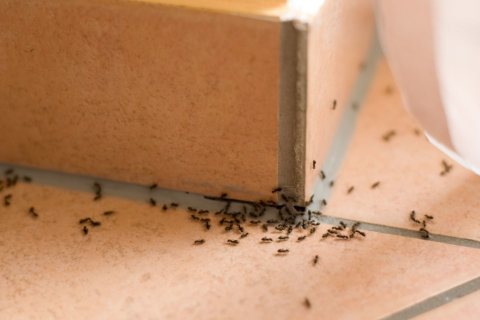National Mosquito Control Awareness Week won’t be “celebrated” until late next month (June 24–30, to be precise).
And by then, it will be too late to be aware of anything other than the fact that you’ve got more bite marks on you than … than … OK — whatever I say here will get me into trouble, so let’s just say “a lot of bites.”
That’s because the first female mosquitoes of the season are biting now and then laying eggs that will hatch in around 10 days. So if you wait until the end of June to take action, you’ll be getting bitten by the great-granddaughters of the first mosquito that got you.
First course of action
Clean your gutters! They are the single biggest unseen breeding source for your local mosquito population.
We’re fighting two very different fiends
To prevent mosquito bites, we are always told to empty out any standing water on our property, like wheelbarrows and pet food dishes. That’s fine for dealing with the old-school mosquitoes that come out to play at dusk and dawn, because those females spend the winter in the adult stage and need to quickly find a water source in which to lay their eggs after they bite you in the spring.
But “new and improved” day-flying mosquitoes, like the Asian tiger, laid their eggs back in the fall, essentially “gluing” the egg masses to objects that will fill with water sometime over the spring and summer, making the “search-and-drain” technique useless.
Ah, but there is a way to fight both types of mosquitoes, and it doesn’t involve toxic insecticides. …
BTI: Bite-taming intercession
The first females of the season are now looking for a “blood meal” — that would be you — after which they will lay their eggs in the nearest source of standing water.
That’s where a substance known as BTI saves the day. BTI is a naturally occurring soil organism with a unique property. Applied to standing water in dunk, briquette or granular form, BTI prevents mosquito eggs from developing into biting adults.
And, unlike chemical larvicides, BTI does not affect any other life form. Birds can drink BTI-treated water. You dog can — and will — drink it. Frogs and toads can live in it. The only thing that BTI does to water is prevent mosquitoes from growing up in it. How cool is that?
Summit is the leading producer of BTI for the retail garden center market.
BTI: Better trapping invention
Yes, the old advice for fighting off mosquitoes was to “empty all the standing water on your property.” That was good advice decades ago, but it won’t stop the first generation of the newer menace — the day-flying Asian tiger mosquito — from hatching.
That why the new advice is to deliberately surround your property with lots of standing water: fill up wheelbarrows, buckets, cat food cans, whatever you got. Treat that water now with BTI and you’ll wipe out that all-important first generation.
Cut to azaleas
Powell in Burke writes: “My azalea bushes are glorious when they’re in bloom, but they’re badly overgrown and in need of aggressive trimming. What is the best way to do so without damaging them?”
It’s not so much “how” as “when” — and luckily, your timing is perfect. Spring bloomers like azalea, rhododendron, forsythia, lilacs and the like should be pruned right after they finish blooming.
If the plants are still small, just prune off the faded flowerheads to encourage new growth and vigorous bloom next season. If they’re overgrown, you can remove up to one-third of the plant—but no more. If you need to do more than that, spread the work out over several springs.
Mike McGrath was Editor-in-Chief of ORGANIC GARDENING magazine from 1990 through 1997. He has been the host of the nationally syndicated Public Radio show “You Bet Your Garden” since 1998 and Garden Editor for WTOP since 1999. Send him your garden or pest control questions at MikeMcG@PTD.net.







